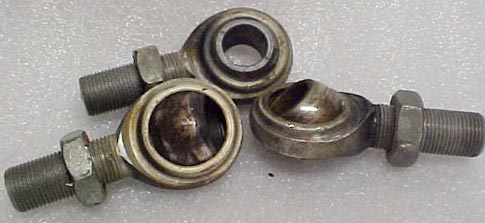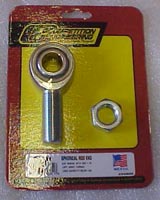|

Installment #4:
Safety - Suspension -
Wiring
Words and photos by Jok Nicholson
4/7/03
Now that I have most of the body work completed
and the "Back-2-Basics" Vega has made its first
trip to the body shop for the special primer
coat, I will tell you what we have been up to.
Safety is always my first concern, so when I
disassembled the four-link bars I inspected
the rod ends and bolts. I found a lot of wear
and some corrosion on all of them and decided
to replace them. When I started looking for
replacements I found there was a wide selection
of rod ends an even wider selection in their
strength.

These are the rod ends
I took out. You can see the rusty spots and
corrosion. They were also "loose" in the housing,
a definite indication they are worn out and
needed replaced.
The "rod end" story:
Here is how I decided on the right rod ends
for Back-2-Basics. I opened about five different
catalogs I had from mail-order chassis shops
to specific catalogs from companies that manufacture
the rod ends. The main concern is radial static
load capacity of these units. My four-link,
and the majority on other race cars, use rod
ends called 3/4"x 3/4". This means the shank
that threads into the four-link tube is 3/4"
UNF (fine thread) and the hole in the rod end
is 3/4".
 These
are the rod ends we chose to replace our worn
out ones. Moroso/Competition Engineering #C6130
and C6131. Chrome moly construction and plenty
tough for our application. These
are the rod ends we chose to replace our worn
out ones. Moroso/Competition Engineering #C6130
and C6131. Chrome moly construction and plenty
tough for our application.
Once I determined what I needed it was time
to decide how much strength I needed in the
rod ends. There are basically three types to
choose from that I found.
- Low Carbon steel, commonly listed in catalogs
as "economy rod ends." These have a static
radial load capacity of about 12,500 pounds
each; NOT a good choice for a four-link suspension
component on a race car. These sell for about
$15.00 to $18.00 each.
- The next choice is an alloy steel rod end
with Teflon liner. These are a great choice
and offer long service and plenty of strength
for all but the really high horsepower or
very heavy cars. These have a static radial
load capacity of about 28,000 pounds each.
These will usually sell for about $45.00 each.
I chose this type of rod end for the Back-2-Basics
car. I chose Moroso's Competition Engineering
part numbers C6130 (right hand threads) and
C6131 (left hand threads). These come with
the correct jam nuts to lock them in place
and it takes four of each part number to complete
the four-link update. It is not a low-cost
maintenance item, but it IS A SAFETY ITEM.
Consider your combination and, if in doubt,
call the Moroso tech line and get their input.
I did!
- 3. The ultimate choice for a rod end in
drag racing is a special chrome moly heavy
duty unit. It has the 3/4" threads on the
shank but rather than the 3/4" hole for the
bolt in the rod end it is built for a 5/8"
bolt. This allows for more material around
the bolt and thus more strength. These are
also available from Moroso under part numbers
C6160 and C6161. They have a static radial
load capacity of over 40,000 pounds. If you
have a very high powered car or are building
one the four-link brackets are different as
the adjustment holes will be 5/8" rather than
3/4" so some planning is needed to implement
these parts. They are also more expensive
and I have seen them in chassis catalogs for
$65.00 each.
NEXT
PAGE >>
|